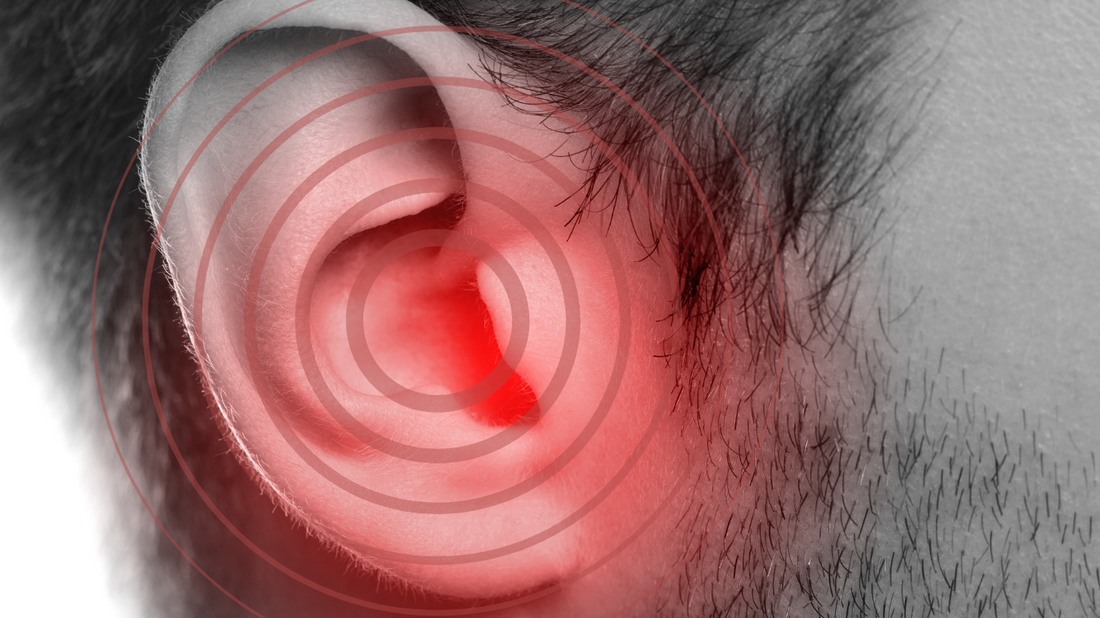Ever been bugged by a constant ringing that no one else hears? Wonder if that whistling in your ears will call it quits after all these years? You're not alone. Many older Americans are tuned into the same silent soundtrack.
Let's sit down, sip some coffee, and chat out loud about the quiet whir buzzing within. We'll share some golden insights about tackling tinnitus, cutting through the noise to make sense of what's going on inside your head. No doctor's lingo here—just plain, straight talk.
What are the Causes of Tinnitus?
Wondering why your ears are buzzing or ringing? There's a bunch of reasons why you might have tinnitus, and knowing them can help you tackle the problem better. Tinnitus isn't picky; it can come from various places, be it health conditions, environmental factors, or even certain medications.
Some of the Common Culprits
- Loud noise: Rocking out at concerts or blasting the TV can leave you with a nasty ring in the ears. Those little hair cells in your ears don’t take kindly to being roughed up by noise.
- Health hiccups: Got high blood pressure or a kink in your blood vessels? That might cause the drumming in your ears too.
- Earwax blockage: A wad of earwax can plug up your ear and kickstart that buzzing. It’s like your ears trying to tell you it’s time for a cleanup.
- Stress: Believe it or not, being frazzled and fried can make your ears ring. The more stressed you are, the louder it seems to get.
Each cause brings its own kind of trouble, and pinning down the right one can mean the difference between constant noise and sweet silence.
Normally, How Long Does Tinnitus Last?
Struck with a bout of tinnitus and wondering how long this unwanted concert's going to last? Well, it might be a flash in the pan or a longer tour, depending on what's got your ears ringing. For most folks, if you've had a one-off blast of loud noise, your tinnitus is likely to fade away after a brief encore - often within a few hours to several days.
But When Should You Expect an Encore?
- Temporary tinnitus: If it's down to a loud event, tinnitus might stick around just long enough for your ears to yell 'uncle'. So, give it 16 to 48 hours and you should be on the mend.
- Persistent pitches: If your tinnitus lingers like a bad cold, hanging on for weeks, then it's time to get curious about the cause.
Now, don't feel disheartened if you're dealing with tinnitus long-term; even after years, changes in lifestyle or treatment might usher in some quiet. But, if your tinnitus hangs around like an overstayed guest, impacting how you enjoy life, a doctor's visit might be your next move.
Why is Tinnitus Permanent Sometimes?
For our pals with tinnitus that's overstaying its welcome, there's often a deeper tune playing. Unlike the tinnitus that takes a bow after a loud concert, some types stick around due to more profound changes within the ear or the auditory pathways in the brain. Recognizing these underlying causes is key to understanding why peace and quiet can be elusive for some.
Chronic Hearing Damage
Years of turning it up to eleven can take their toll on your ears. If those hair cells in your inner ear have taken one too many hits, they might send out tinnitus signals non-stop, like a broken record.
Medication Side Effects
Certain medications are notorious for putting your ears in a bind. If you've been prescribed medication that lists tinnitus as a sidekick, that could be your villain right there.
Health Conditions
Sometimes, the plot thickens with your overall health. Conditions like Meniere’s disease or TMJ disorders can crank up the internal volume permanently.
The takeaway? If your tinnitus feels like a series finale with no ending, it might be time to get the full story from a health professional. Because sometimes, turning down the volume on life’s soundtrack requires a helping hand.
How Can I Get My Tinnitus to Subside?

Finding some peace when your ears are giving you a never-ending concert can be tricky, but don't throw in the towel just yet. You've got a few moves to help dial down that internal volume.
Silence Isn't Golden—Mask It
When the quiet gets too loud, masking sounds are your friend. Flip on a fan, a white noise machine, or a calming nature soundtrack. Creating a gentle background hum can help distract your brain from the tinnitus.
Guard Your Gears
Loud noises can send your ears into a frenzy, so play defence. Whenever you step into the noise arena, ear protection is a must – think earplugs or earmuffs.
Chill Out
Your body's stress levels and tinnitus can tango together. Learning to keep your cool with relaxation techniques might just slow that dance down—think yoga, deep breathing, or a leisurely walk.
Live Healthily
Cut back on the vices, like nicotine and caffeine, and watch your overall health. Sometimes, just improving your day-to-day well-being can turn the tinnitus volume knob left.
Remember, these aren't cure-alls but consider them your toolkit to nudge tinnitus offstage. And always, keep in tune with your doctor for personalized advice on your tinnitus mix.
Can Tinnitus Go Away After Years of Having it?
You might wonder if that pesky ringing in your ears has an expiration date, especially if it's been your constant, unwelcome soundtrack for years. The truth is, tinnitus is a bit of a wild card. For a lucky few, it fades into the background over time, while others become long-term audience members to their own personal ear concert.
When the Echoes Fade
Time can sometimes be a healer. For those who've experienced extended periods of tinnitus, there's always a chance that it'll become less bothersome. The brain has a knack for habituating: gradually paying less attention to the tinnitus noise, making it less noticeable.
Adapting to the Constant Chorus
- Long-term tinnitus might not clear up overnight, but many people learn to live with it, finding it becomes part of their normal soundscape. Just like how you tune out the hum of a refrigerator, your brain can learn to ignore the buzz of tinnitus.
- Engaging with sound therapy or taking advantage of hearing aids with tinnitus-masking features can offer a hand in turning down the internal volume.
- It's also important to stay connected socially and keep your mind occupied - staying active can help push tinnitus further from your focus.
If you've been putting up with tinnitus for more than a little while, it's wise to seek professional advice. An audiologist or ENT specialist can check out what's going on and, even if there's no quick fix, they can offer strategies to manage the noise in your noggin.
If Tinnitus is Incurable, How Does Visiting a Medical Specialist Help?
Stepping into a specialist's office when you're grappling with tinnitus is like finding a compass in the wilderness. It's true, science hasn't handed us a silver bullet for tinnitus, but that doesn't mean you've gotta live with the noise at full blast. Specialists are like the savvy guides; they can't make the forest disappear, but they sure can help you navigate through it.
Finding and Fixing the Fixable
Some types of tinnitus are like a pesky knot in your shoe laces—annoying but fixable. An expert's eyes and tools can spot issues like earwax buildup, infections, or even medication side effects that might be fueling your ear's symphony. Sometimes, fixing these can have your ears dropping the beat.
Turning Down the Volume
When tinnitus won't tap out, specialists can still turn down the volume for you. There are gizmos and gadgets—like hearing aids, sound therapy devices, and tailor-made masking sounds—that can blend the ringing into the background music of your life, making it less of a headline act.
Coaching You Through the Chorus
And then there's facing the music—literally. Specialists can coach you in coping strategies that can teach you to live in harmony with your tinnitus rather than in a boxing match. From cognitive behavioral therapy to relaxation techniques, they've got an ensemble of tactics to ease the noise stress.
So, if tinnitus is your uninvited life soundtrack, a trip to the doc can still pen you some quiet verses. It's not about curing; it's about living—and living better, despite the hiss, hum, or whistle only you can hear.
Are any Over-the-Counter Tinnitus Treatments Reliable?
On the hunt for some quick relief, folks often wonder if there's magic in a bottle at the local pharmacy. But here's the straight talk: when it comes to tinnitus, over-the-counter meds and supplements are more miss than hit.
The Scoop on Supplements
A lot of these "miracle cures" are just jazzed-up vitamins with upbeat marketing. Don't get swayed by those tall tales of overnight success; science hasn't yet found a supplement that can truly say sayonara to tinnitus.
Sorting Fact from Fiction
It's easy to fall for the stories of folks who swear by these remedies, but remember—our minds can play tricks on us. That snazzy pill might just be riding the coattails of time, where natural ebbing of symptoms gets mistaken for a cure.
When Placebos Paint a Pretty Picture
And don't forget the placebo effect; it's powerful enough to make us think a sugar pill is a superhero. But as the novelty wears off, so does the illusion, and you're back to square one with ringing in your ears.
So save your pennies and steer clear of promises in pill form. If tinnitus is the tune you're tired of, a real-deal doc is who you want conducting your care, not the supplement aisle sales pitch.
Conclusion
Journeying through the labyrinth of tinnitus can feel solitary, but remember, you're not without a guide or hope. It's clear that the paths to quieting that internal orchestra are as varied as the individuals who walk them.
Your Toolkit for Tinnitus
Whether it's protecting your hearing, finding solace in sound masking, embracing healthier habits, or seeking tailored strategies from professionals, you've got a toolkit at your disposal.
The Power of Persistence
Don’t be disheartened if the ringing doesn't exit stage right immediately. With perseverance and the right support, many find their tinnitus becomes a more manageable backseat passenger on life's journey.
Embrace the steps you can take, from expert consultations to simple lifestyle tweaks, to turn down the volume on tinnitus. Each action, each piece of knowledge, and every small victory lead you closer to harmony.
Conclusion: Tackling Tinnitus Together
Tinnitus may have had you feeling like you're stuck at a never-ending rock concert, but the show can soften.
Your personal symphony of whistles and buzzes is unique. And while the ringing echoes through your ears alone, the quest for quiet is a shared journey.
A clear takeaway, folks, is that there's no magic pill to pop this bubble of noise. But there are real steps to take.
From the everyday choices you make, to the power of protection and masking sounds, right to a visit with a savvy expert.
Live well, steer clear of empty promises, and remember—sometimes, the help you need is just 'round the doctor's corner.
And, when you're tinkering with your tactics, feel free to try out HearWell Group's hearing aid that might just be your ticket to a softer serenade.
Keep chipping away, and with some patience, you might just find that tinnitus dims to a faint whisper in your soundtrack of life.
Sources & References
- Biswas, R., Lugo, A., Gallus, S., Akeroyd, M. A., & Hall, D. A. (2021). Tinnitus prevalence in Europe: a multi-country cross-sectional population study. The Lancet Regional Health - Europe, 12, 100250. https://www.thelancet.com/journals/lanepe/article/PIIS2666-7762(21)00236-2/fulltext
- Bhatt, J. M., Lin, H. W., & Bhattacharyya, N. (2016). Prevalence, Severity, Exposures, and Treatment Patterns of Tinnitus in the United States. JAMA Otolaryngology–Head & Neck Surgery, 142(10), 959–965. https://jamanetwork.com/journals/jamaotolaryngology/fullarticle/2533660
- Kim, H. J., Lee, H. J., An, S. Y., Sim, S., Park, B., Kim, S. W., Lee, J. S., Hong, S. K., & Choi, H. G. (2015). Analysis of the prevalence and associated risk factors of tinnitus in adults. PLOS ONE, 10(5), e0127578. https://journals.plos.org/plosone/article?id=10.1371/journal.pone.0127578

The Hear Well Group Research Team: Trusted Hearing Health Insights
Our experienced research team compiles hearing health data from credible, peer-reviewed sources and presents it in easy-to-understand terminology. We ensure accuracy and trustworthiness, providing up-to-date, evidence-based recommendations to enhance hearing care practices and inform our readers' hearing well-being decisions.


